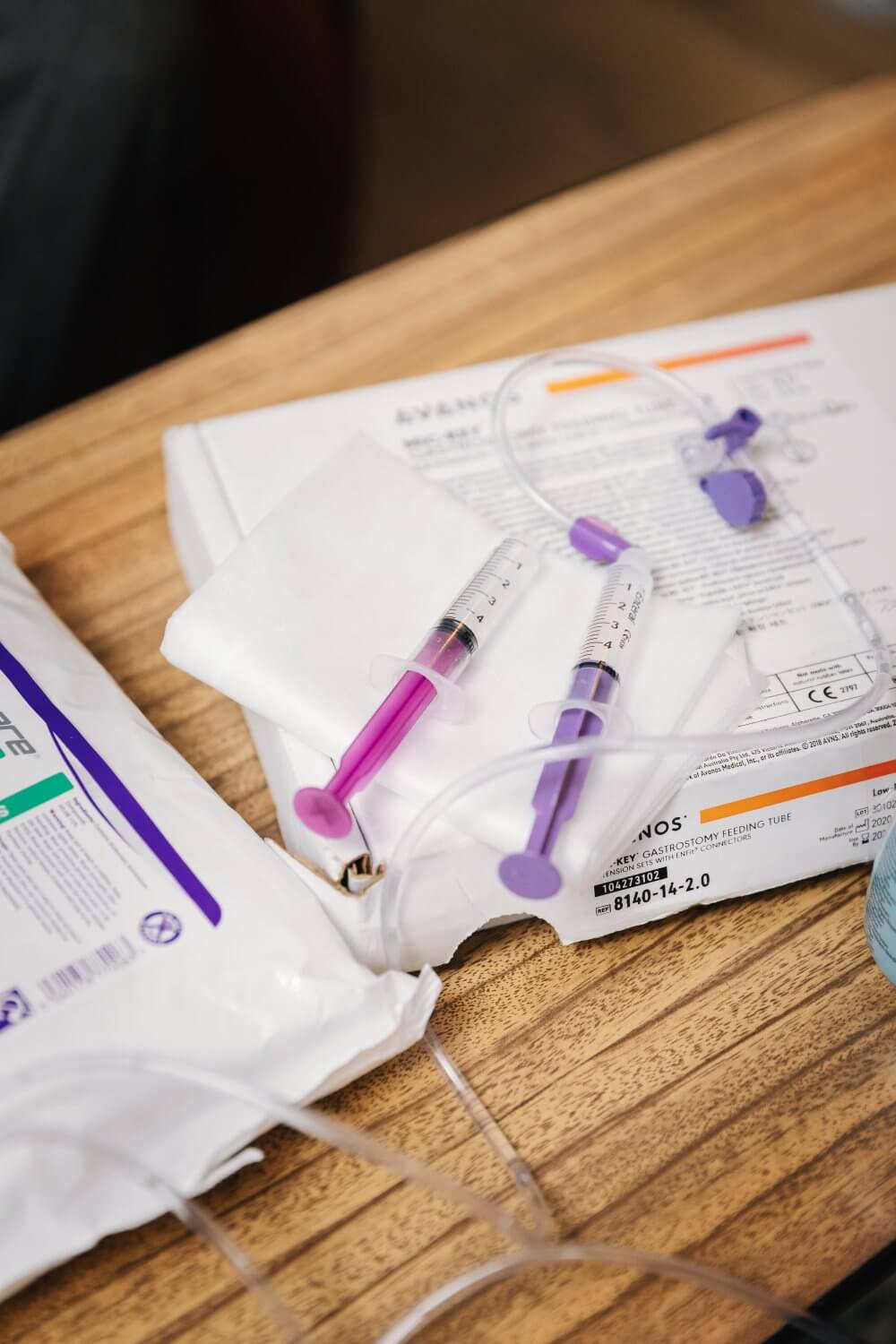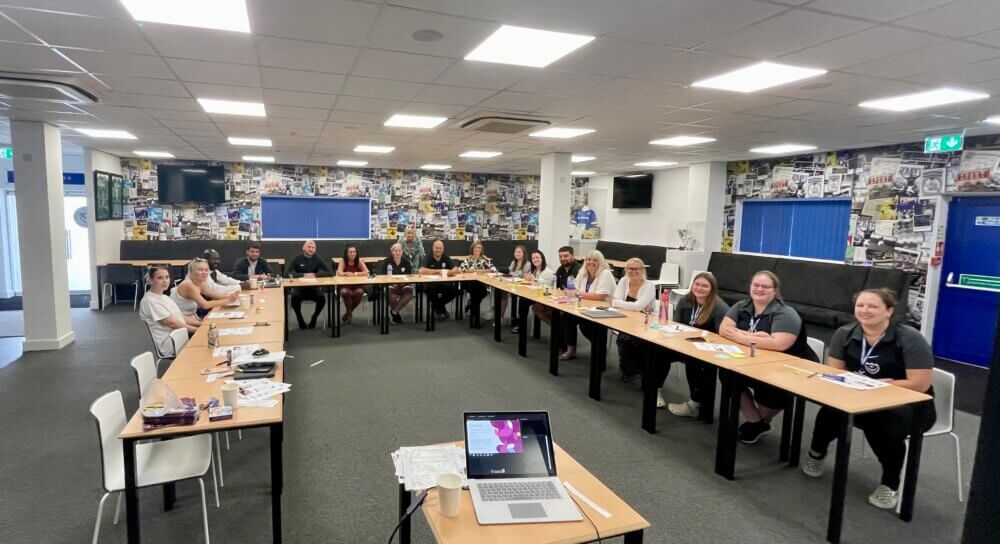
Gastrostomy Care & Feeding Support At Home
Our Care Professionals can offer gastrostomy care and tube feeding support, assisting you to live well at home.
Gastrostomy care at home, tailored to you
Our specialist Care Professionals can provide support for you or your loved one, to enjoy independent life at home. We can help take care of daily food and drink intake through feeding tube management and assist with administering medication if required.

Our Care Professionals
Home Instead’s Care Professionals are trained to the highest clinical standards and will work with your own doctors and health teams to ensure you are receiving the best possible care at home from people who share your hobbies and interests and are passionate about helping you and your loved ones.
We can provide support in a range of ways to meet your individual needs, such as hourly care for a few hours a week, a couple of hours daily, or even 24-hour live-in care to support you in managing your symptoms at home.

How can we help?
We've helped thousands of families to stay safe, comfortable and happy at home. Whatever situation you're facing, or whatever the question is, Home Instead is here to help.
Are you in need of a little guidance right away?
03300 583450Are you in need of a little guidance right away?
03300 583450What we do to care for your loved ones
We offer two types of home care: hourly care, where we visit at set times, or live-in care, where a carer resides in the home. Both are overseen by our care management team and delivered by compassionate Care Professionals. Each care package is made up of a unique mix of services to meet your needs.
Companionship care
We carefully match Care Professionals with clients to ensure a meaningful bond is created.
Home help & meal prep
Keeping the home environment clean, safe, and nourishing with home-cooked meals.
Personal care
Assistance with bathing, dressing, and personal hygiene, always respecting the dignity of your loved one.
Mobility support
Helping your loved one move around their home safely, including transfers and positioning.
Health appointment management
We support your loved one to attend those important health appointments.
Community engagement
We enable your loved one to continue to do the things you enjoy, be it a visit to the garden centre or your local art group.
Transportation
Assistance getting your loved ones from A to B, whether it be to go visit a friend or help with their shopping.
Medication management
Ensuring medicines are taken correctly and on time, supporting overall health.
Get in touch today to
see how we can help
What is a gastrostomy or enteral tube?
When a person is unable to take food, or enough food, orally then they may have a tube surgically inserted directly into the stomach (gastrostomy) or small intestine (jejunostomy). The tube then sits on the outside of the abdomen and a specially produced ‘enteral’ milk regime is prescribed by a dietician to ensure the individual receives all the nutrition and hydration they need.

What is gastrostomy care and feeding support?
As part of our Healthcare at Home provision, our Care Professionals are specifically trained in providing care and support for several types of enteral tubes. This may involve cleaning the stoma (including any tube advancements/rotations), administering medications, providing bolus feeds, or setting up feeding pumps as well as troubleshooting where necessary.

Benefits of gastrostomy care and feeding support
Care Professionals are fully trained and deemed competent in your care needs, so they care they provide can help to reduce the number of infections and the need for hospital admissions. Care is carried out when you need it, not when it suits others and reduces the risk of complications.

Why choose gastrostomy care and feeding support care at home?
Having Health Care at Home with Home Instead allows you to maintain your independence, routine, and lifestyle so you can live your best life at home. We work with you and your clinical team to ensure the best care is delivered to the highest standard, ensuring a fully bespoke and tailored care plan is provided.

Guides
Advice & Support

Pre-Bereavement Grief
Discover more

Looking for Respite Care? Look no further than the home
Discover more

Why getting Respite Care is the trick to being a good family caregiver
Discover more

New Dementia Training
Discover more

Making communities dementia friendly
Discover more

Stepping into the shoes of someone with dementia with Training2Care’s Dementia Bus
Discover more
FAQs
How will this care help me or my loved one?
A gastrostomy has been recommended due to the fact you or your loved one are not receiving the right amount of nutrition, are unable to swallow or tolerate food by mouth. Getting the nutrients through tube feeding should allow all nutritional needs to be met. Our Care Professionals providing feeding support can ensure that you or a loved are supported while using this method, and can assist if any issues arise.
How long will I need gastrostomy care and feeding support care?
This can vary from person to person, for some it is permanent, but for many people it can be a temporary measure so care will only be required until they are able to eat and drink safely again. Our Care Professionals will work alongside your clinical team to provide support as and when you need it.
Can I live a normal life while receiving gastrostomy care?
Once you are back at home following surgery, it’s only natural you would wish to continue with a number of social activities. While planning round feeding support can be difficult, small adjustments can help you carry on with whatever you feel well enough to do.
How can I handle loss of appetite for myself/my loved one?
Experiencing a loss of appetite as we age is quite common, and it’s usually nothing to be overly concerned about unless there’s been a noticeable and sudden drop in weight. It’s estimated that about 20% of older adults may experience a decrease in their appetite over time.
There can be various reasons behind this change, ranging from a general disinterest in food to health issues that make eating uncomfortable or unappealing.
If you’re finding it challenging to encourage a loved one to eat more, one approach could be to focus on enhancing the nutritional value of the smaller portions they do consume. Ensuring they’re getting the necessary nutrients can help maintain their overall health.
Ultimately, the key is to honour their preferences and desires when it comes to food. Research indicates that when individuals have the freedom to choose what they eat, they tend to eat more regularly and enjoy their meals more. So, it’s important to find out what foods they’re in the mood for and try to accommodate those cravings. By catering to their preferences, we can help them maintain a healthier relationship with food as they age.












